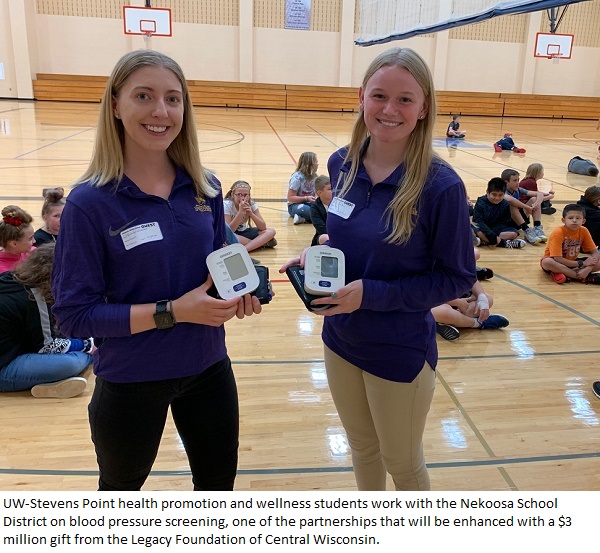Legacy Foundation gift of $3 million will enhance community health
 A $3 million gift from the Legacy Foundation of Central Wisconsin to the University of Wisconsin-Stevens Point will create a partnership to improve health and wellness of communities in South Wood County.
A $3 million gift from the Legacy Foundation of Central Wisconsin to the University of Wisconsin-Stevens Point will create a partnership to improve health and wellness of communities in South Wood County.
The collaboration will identify and address challenges and opportunities related to public health. Initial partners include the Legacy Foundation, Wood County Health Department, Aspirus Riverview Hospital, Marshfield Clinic Health System, Wisconsin Rapids Public School District, Port Edwards Public School District, Nekoosa Public School District and UW-Stevens Point, with more expected.
"I am beyond grateful to the Legacy Foundation for this generous gift and exciting opportunity to work together with our partners in South Wood County to improve community health," Chancellor Thomas Gibson said.
The gift endows a professor of population health with expertise in outcomes-based population health, data analytics and assessment. A search will begin soon for this national expert. (Interest earned from an endowed gift is used to cover salary, benefits and research expenses.)
Population health focuses on interrelated conditions and factors that influence the health of populations – a group of individuals, often in a geographic area – over the course of their lives. Partners establish systems for gathering and analyzing data, then use results from these robust data management systems to refine actions and improve health outcomes.
"The Legacy Foundation of Central Wisconsin exists to improve the health and well-being of our communities. This partnership will help align our efforts and resources with those of local schools and universities, health care providers and government agencies," said Michael Bovee, Legacy Foundation executive director. "Working together we can accomplish great things."
The endowed professor will ensure a collaborative, collective and sustainable population health strategy. Based in South Wood County, the position will have a team of graduate assistants, interns and pre-professional practicum students collecting data, accessing best practices, and identifying and assessing program outcomes.
"This initiative will bring much needed capacity to address the greatest barriers to overall well-being," said Sue Kunferman, Wood County Public Health Department director/health officer. "With partners working collaboratively, we can have a positive impact on issues such as access to safe and affordable housing, behavioral health, substance use and more."
It will build on efforts under way since 2015, when UW-Stevens Point began assisting South Wood County to identify and address root causes of health disparities in the local population. A goal is to have an integrated approach to accurately assess and rapidly respond to community health disparities.
"The initiative links the university to South Wood County, representing our long-term commitment to the region and to improved health outcomes," said Professor Corey Huck, administrator, UW-Stevens Point School of Health Sciences and Wellness.
In addition to population health expertise, South Wood County communities will have access to UW-Stevens Point faculty with expertise in 20 related fields, including nutrition, nursing, rehabilitation, human services and family studies, physical education, health education, health economics, data analytics and social work.
The partnership will strengthen South Wood County health agencies' ability to measure outcomes and impact through data collection and analysis; deliver outcome-based programming; conduct long-term research on impact and serve as a model in the country; and develop a stronger workforce with access to graduating students.
It will provide UW-Stevens Point students with hands-on learning experiences that complement their classroom experience. Students will use data to assess short- and long-term success of community health programming. They will develop a deep understanding of the impacts of social factors on the health of a community, view health of individual communities holistically and learn about prevention as well as treatment, Huck said.
"In addition to real-life learning opportunities for our students, this partnership will provide a framework for population health collaboratives that may be duplicated throughout the country," Gibson said.

